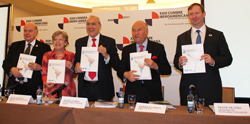Suriname
Innovation, diversification and better logistics key to sustainable and inclusive growth, says latest Latin American Economic Outlook
18/10/2013 - After a decade of relatively strong growth, Latin America is facing headwinds associated with declining trade, a moderation in commodity prices and increasing uncertainty over external financial conditions, according to the latest Latin American Economic Outlook jointly produced by the OECD Development Centre, the UN Economic Commission for Latin America and the Caribbean (UN ECLAC) and CAF - Development Bank of Latin America.
 |
The report was released in Panama City during the XXIII Ibero-American summit. Weak economic performance in the euro area, the slowdown in some emerging economies and uncertainty over U.S. monetary and fiscal policy are also weighing on Latin America’s weaker outlook.
“Latin America can still achieve sustainable and inclusive growth, but the window is narrowing,” said OECD Secretary General Angel Gurría. “To meet the new challenges and opportunities posed by an increasingly interconnected global economy, countries across the region need to boost competitiveness, through economic diversification, improved logistics performance and a move up the value chain towards higher value-added activities,” Mr Gurría said (read the full speech in Spanish). |
Alicia Bárcena, ECLAC Executive Secretary said: “It is necessary to adopt reforms to enhance productivity and reinforce the capacity of governments to respond to the demands of an ‘emerging middle class,’ while redoubling their efforts to reduce the levels of poverty and inequality.”
The Latin American Economic Outlook says technological innovation and economic diversification will be key to boosting productivity and potential growth, which remain low when compared to other regions. Latin America’s contribution to global GDP growth has remained virtually unchanged (i.e., between 7% and 9%) since the early-1990s, while that of emerging Asia has more than doubled in the same period.
Many Latin America economies remain heavily focused on natural resources – commodities make up 60% of the region’s goods exports, up from 40% at the beginning to the last decade.
The report presented today encourages countries to use their natural wealth as a foundation for transitioning to production processes that use technology and knowledge. It also advocates that Latin American economies diversify exports, particularly toward the services sector, which offers greater opportunities over the medium and long-term future. Deepening the regional market would offer additional room for the services sector to grow and diversification to flourish.
“Further investment in transport infrastructure, and better logistics performance in general, is needed.” said Enrique García, President and Chief Executive Officer of CAF. “Latin America’s production structure is more sensitive to logistics than that of the OECD countries. The share of time-sensitive exports in Latin America is three times that of the OECD countries, which underlines the importance of improving logistics to strengthen overall economic performance”, Mr García, added.
Transport infrastructure remains deficient, with an urgent need for investment in roads, railways, ports and airports. Investing 5.2% of regional GDP per year in infrastructure projects would help Latin America close the infrastructure gap with other emerging regions and could increase GDP growth by an estimated 2 percentage points per year. Much can also be done in the short term to improve the transport of goods and services using existing infrastructure, through integrated logistics policies, modern storage facilities, efficient customs and certification procedures, and promoting competition in transport.
Read the Press Release in Spanish - Portuguese
FOR FURTHER INFORMATION, PLEASE CONTACT:
OECD Development Centre, Bochra Kriout ([email protected], Tel: +33 (0)6 26 74 04 03)
ECLAC, ECLAC Public Information and Web Services Section, ([email protected], Tel: + (56 2) 210 2040)
CAF, Saskia Luengo, ([email protected], Tel: +58212-2092353)
- For more information on the Latin American Economic Outlook, visit: www.latameconomy.org
- Read online the full edition of the Latin American Economic Outlook
- To obtain a copy of the Economic Outlook, journalists are invited to contact the OECD Development Centre ([email protected]; tel: +33 1 45 24 82 96).
NOTES TO THE EDITORS
The Latin American Economic Outlook
Published for the seventh consecutive year, the Latin American Economic Outlook 2014 features a macro-economic analysis of trends in the region and a focus on logistics for structural change. The content of the report will be available online on 18 October 2013 on www.latameconomy.org and www.cepal.org.
The OECD Development Centre
The Development Centre (www.oecd.org/dev) helps policy makers in OECD and partner countries find innovative solutions to the global challenges of development and poverty alleviation.
The Economic Commission for Latin America and the Caribbean (ECLAC)
ECLAC (http://www.eclac.org) is one of the five regional commissions of the United Nations. Headquarter in Santiago, Chile, ECLAC contributes to the economic and social development of Latin America and the Caribbean through regional and subregional cooperation and integration.
CAF – Development bank of Latin America
CAF, development bank of Latin America, has the mission to promote sustainable development and regional integration by financing projects in the public and private sectors, and provide technical cooperation and other specialized services. Established in 1970 currently with 18 member countries -16 in Latin America and the Caribbean with Spain and Portugal - and 14 private banks, CAF is one of the main sources of multilateral financing and an important creator of knowledge for the region. More information www.caf.com
Related Documents